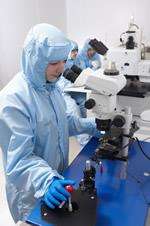Researchers launch next generation of brain scanners

The next generation of magnetoencephalography (MEG) brain scanners is now under development and one of the key enablers to produce lower cost, high performance machines is a nano electronic device designed at Royal Holloway by Professor Victor Petrashov in the Department of Physics.
The HyQUID is a novel development of the generic SQUID, Superconducting Quantum Interference Device, a very sensitive magnetic field detector. The HyQUID retains the sensitivity of the SQUID to magnetic field whilst having better overall performance characteristics and critically is simpler to fabricate and calibrate. One patent has already been granted and a second patent is currently being examined.
Professor Petrashov said, "It has been surprising and immensely gratifying to see how quickly a device founded on fundamental, ground breaking quantum physics research at Royal Holloway is likely to generate impact in such an important area of human health and wellbeing."
The MEG scanner development is being undertaken by a new UK company, York Instruments Ltd. Backed financially by US based investment, the development will enable MEG scanners to be produced at much reduced and affordable cost, providing wider accessibility.
York Instruments has been granted an exclusive license to use HyQUID in this exciting development alongside two other key technology components developed within the UK; the data acquisition software and specialist electronics are provided under license from the University of York and the superconducting cooling solution will be provided by Oxford Instruments.
Professor Gary Green, Chief Technology Officer of York Instruments comments, "The development of the HyQUID and its incorporation into this new medical imaging device has allowed a step change in the performance and availability of MEG technology. The integration of the key technologies has opened up a new global market for York Instruments with exciting new applications in neurology and psychiatry."
Early research that led to the design of HyQUID was funded by the EPSRC and further development work was funded by Royal Holloway's Gateway commercialisation fund established jointly by the university and Honorary Fellow, Yazan Mufti.
Research work in the area of nano quantum devices is growing and with the recent announcement of the establishment at Royal Holloway of a UK Centre for Superconducting and Hybrid Quantum Systems and the setting up of the new Department of Electronic Engineering, Royal Holloway can anticipate playing a leading role in the research, development and exploitation of quantum technologies.
Provided by Royal Holloway, University of London



















